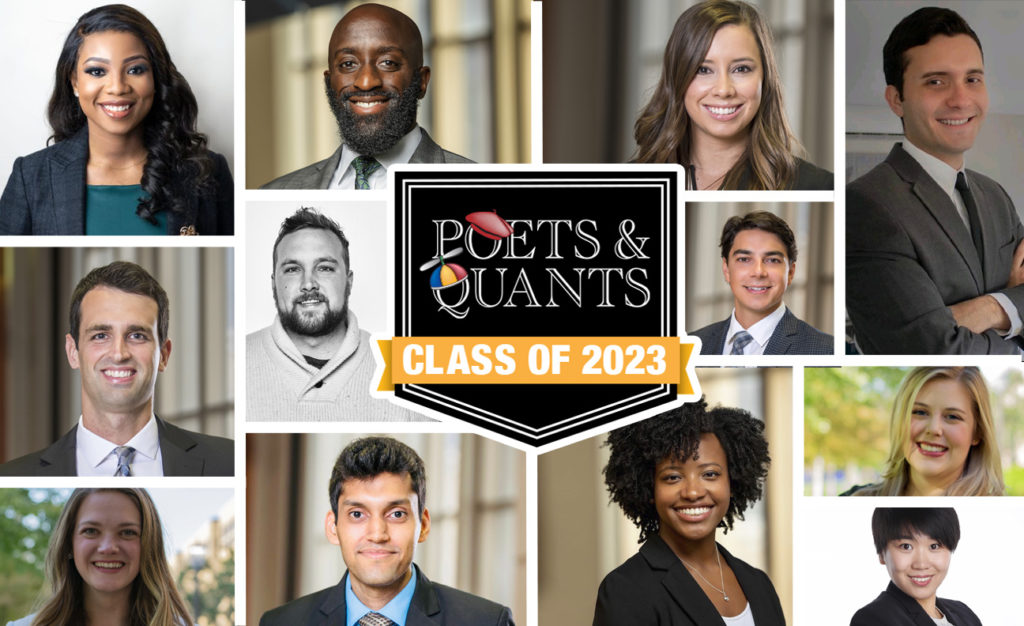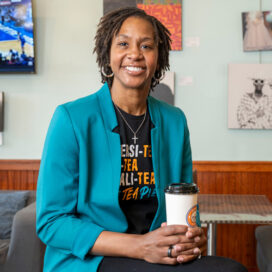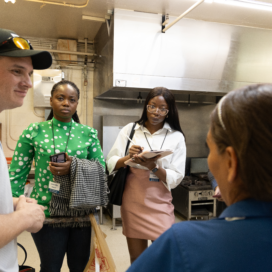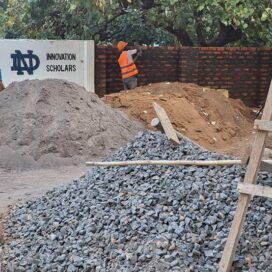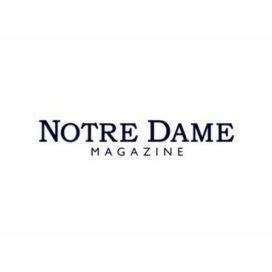Meet Notre Dame Mendoza’s MBA Class Of 2023
Published: September 9, 2022 / Author: Jeff Schmitt, Poets & Quants
Note: This article originally was published on PoetsandQuants.com as part of its “Meet the Class” feature series.
Excellence, Respect, Integrity, Teamwork, and Accountability.
The bedrock values of the University of Notre Dame. Timeless and inalienable – the highest of expectations and the deepest of promises. It was founded by underdogs seeking to meld Catholic values with Enlightenment rigor. Over time, Notre Dame became a journey, a refuge for seekers who wanted to develop the habits and judgment to became forces for good. That meant embracing their potential – and the demands needed to reach and sustain it. Even more, it required students to tackle issues with a mix of curiosity, reasoning, and love that ultimately produces action.
Faith, Family, Academics, Service … and Football.
Call them the hallmarks of the Notre Dame experience. Students come to Notre Dame, to paraphrase Coach Lou Holtz, to ‘become someone as much as learn something.’ Every year, business students heed a call, to pursue careers with a higher purpose – a spirit defined by elevating others over enriching one’s self. This “Growing the good in business” philosophy guides the MBA program at the Mendoza College of Business. Here, you’ll find servant leaders looking to make their world better; they may not yet know how, but they understand the what and why behind it. So they come to South Bend with a mission – one that is intimately tied to their beliefs, experiences, and identity.
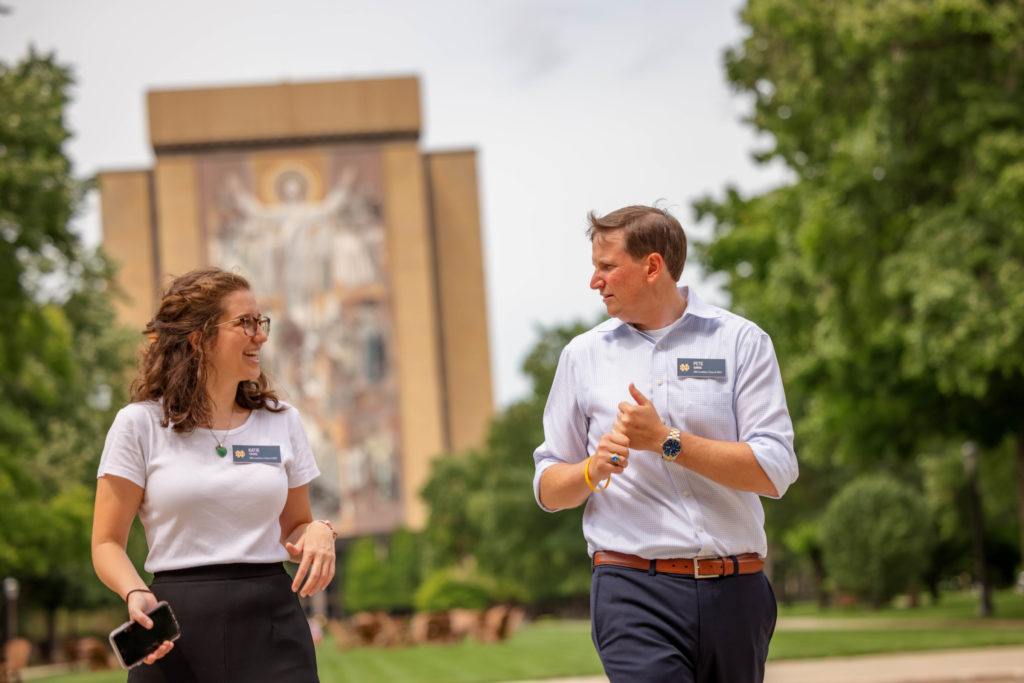
The Hesburgh Library with its famed “Touchdown Jesus” mural is a favorite place for students to study and gather on campus. (Photo by Peter Ringenberg Photography)
A CLASS SHARES ITS MISSIONS
That has certainly been true for Nicaragua’s Napoleón Astorga Solano, previously an in-house counsel who joined Mendoza’s MBA Class of 2023. “I have seen first-hand from past and current experiences in my home country how businesses determine the faith of a society (for better or for worse),” he writes. “This motivated me to do good business – not only in terms of profitability, but also in terms of contribution to employees, clients, suppliers, and ultimately to society as a whole…I didn’t know how to put my ideas into practice; thanks to the Mendoza program I have been able to understand how businesses impact society, what better practices can be implemented in the business setting to make everyone better off by the existence of your business, and how to get other people as motivated as you are about an idea.”
Big picture: the Notre Dame legacy is building up students who fan out after graduation, inspiring by example and making a difference in ways great and small. For Annie Crider, a theology teacher from the Jefferson City diocese, that means developing her talents to achieve the greater good. In Solano’s experience, it boils down to always be seeking out a better way, to harness communities around causes and outline a vision that motivates people through setbacks and doubts. These drivers make Mendoza MBAs all the more formidable after graduation.
“As a financial professional who is going to work in health-care industry, my mission is to make medication and treatment more affordable for patients,” notes Chloe Yang, previously a private wealth advisor. “Mendoza is preparing me with the right knowledge — both financial and moral — to contribute to humanity.”
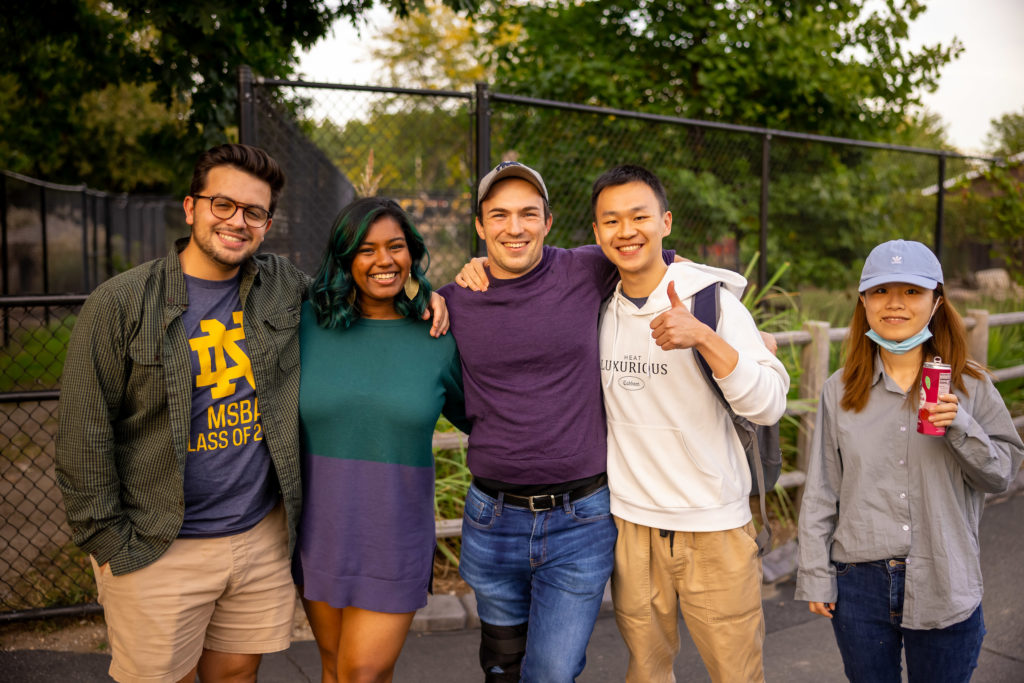
MBA Fall Social at the Zoo 031 Social activities such as outings to the local zoom and other area attractions allow students, faculty and staff and their families to have some fun and get to know each other. (Photo by Peter Ringenberg Photography)
A DIVERSE CLASS
This mission isn’t tethered to any cultural or religious traditions either, adds Songee Barker, a 2022 grad and P&Q Best & Brightest MBA. “Because Notre Dame is a Catholic university, I think some might think that there is not much diversity here. In my time at Mendoza, I have been fortunate to work with and get to know individuals from all different religious backgrounds, geographic locations, and professional backgrounds. Notre Dame attracts the best talent from so many different places, which creates a diverse experience in many ways.”
Diverse? Now, that’s an understatement. Just look at what the Class of 2023 does outside the classroom. Funmi Owopetu – a self-proclaimed native of Nigeria, Calgary, and Houston – already holds four degrees. Speaking of well-traveled, Christian Montgomery has visited 43 countries (and owns 300 pairs of shoes). In terms of contrasts, Temitayo Ade-Oshifogun is the author of over 60 poems, while Natalie Kvochak is an environmental specialist who has been part of a capella groups (and currently sings in Notre Dame’s Liturgical Choir).
And you could say that Dan Chapman was destined to someday reach South Bend. After all his first tattoo read “Play Like a Champion Today” – the locker room slogan made famous by Notre Dame football. By the same token, you could argue that business school was undoubtedly in the cards for Napoleón Astorga Solano.
“As a child, I used to pretend play to be a banker,” he writes. “I would put on my blazer (the only one I had) along with my most professional-looking shorts, grabbed an empty cardboard box to use as a desk, and served my only imaginary customer – Ms. Vortex (inspired by a character from the Jimmy Neutron cartoon show).”
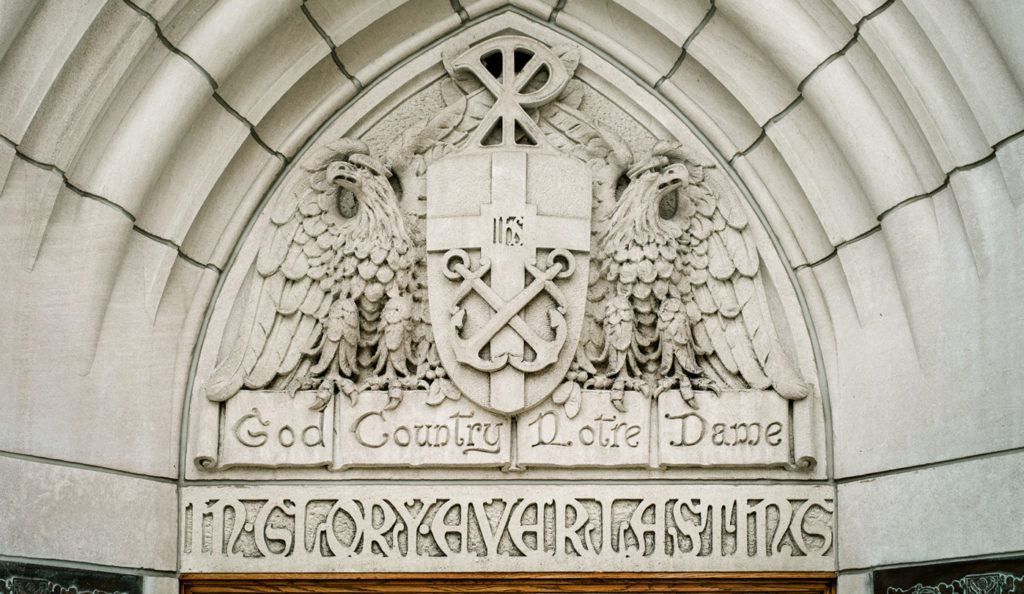
The well-known “God, Country, Notre Dame” plaque is installed above the doorway to Notre Dame’s Basilica of the Sacred Heart, which serves the spiritual needs of the students, faculty, and staff of the University as well as members of the greater South Bend community. (Photo provided by the University of Notre Dame)
MAKING AN IMPACT
Not surprisingly, Solano ended up at a bank – the Central American Bank for Economic Integration (CABEI) – after earning his Master of Laws from Harvard Law School. Before that, he ran a program designed to provide credit loans that enhanced the farming practices and technological capabilities of small and mid-sized farms.
“We achieved outstanding results for this program that would open channels for similar programs in the future: The program had more than 3,000 beneficiaries with an average loan of six-thousand dollars, significant improvement of productivity indicators, and a default rate lower than the average in the national financial system for the industries financed.”
Ms. Vortex would be proud!
And so would James Harden … of Christian Montgomery. Most recently, Montgomery served as a senior product manager at adidas, where he focused on football apparel. However, he made his biggest impact in basketball, designing country-specific shoes for players in China and Japan. Staying in Asia, Raghav Agarwal co-founded a non-profit, Rise for Humanity, in India. For eight years, this organization funded empowerment programs, such as education, for women. Education is also Annie Crider’s passion. Now a McKinsey intern, she recently built an entire curriculum for her junior high students.
“The content required earning the trust and respect of my students, as well as their parents, by building meaningful relationships,” she tells P&Q. “Creating a culture where my students felt valued and wanted took time but was the most rewarding aspect of my career because students started coming to me with their struggles and trusting me to help them. They also were more willing to do what was asked of them because they trusted I had their best interests at heart.”
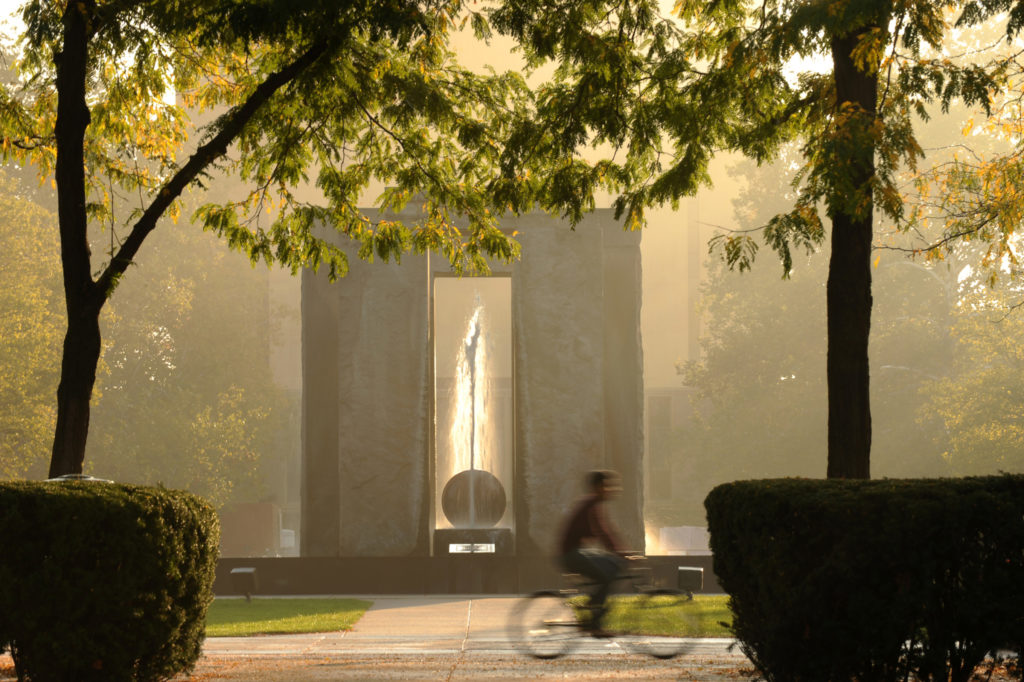
Stonehenge on a misty morning..Photo by Matt Cashore/University of Notre Dame
CHANNELING A PASSION INTO A VENTURE
In a school that seeks difference makers, several class members truly fit the bill. Dan Chapman made partner on his capital markets team at CBRE. Funmi Owopetu helped her firm double its client base by spearheading a global certification process. At IG Wealth Management, Chloe Yang managed a team that catered to high-net-worth clients.
“My typical clients were successful business owners who had immigrated from China to Canada. In 2020, my team’s net cash inflow ranked number 1 in whole Quebec region in my company. The asset under management reached $50 million before I joined Mendoza.”
Temitayo Ade-Oshifogun has made his name in cryptocurrency. Laid off in the advent of COVID, he turned to God, which led him to a crypto startup, where he doubled the number of investors. Since starting at Mendoza, he has launched a crypto strategy startup of his own. “It brings me so much joy seeing people learn about crypto and the many use cases of the technology driving the space,” he tells P&Q. “It’s only the beginning, and I am very grateful for the lives I have had the privilege and honor to positively affect!”
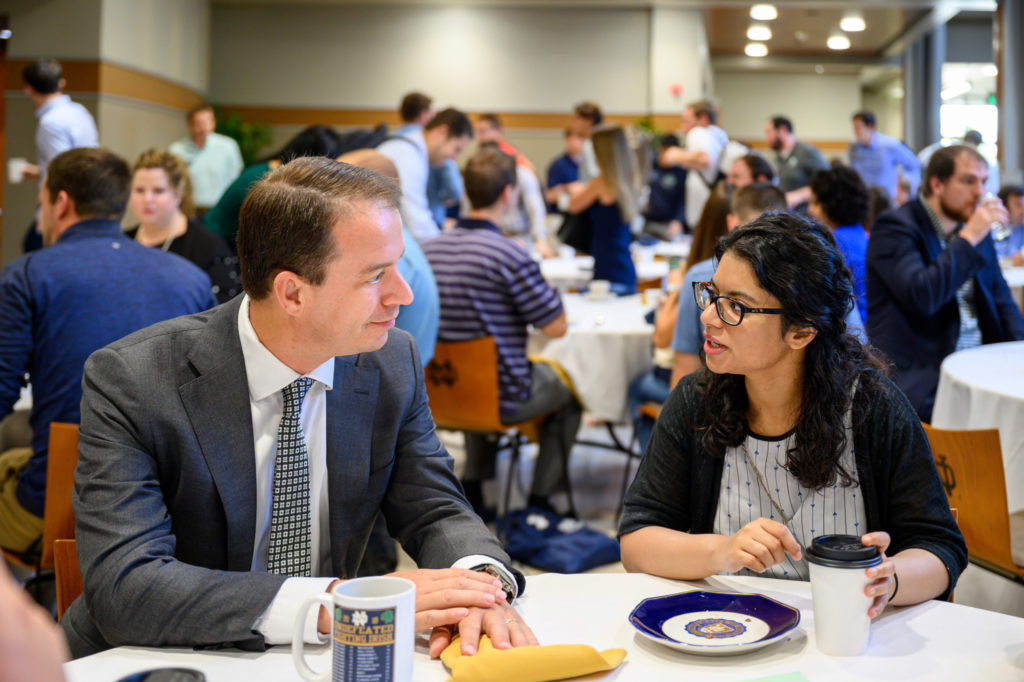
Mendoza College of Business Dean Martijn Cremers chats with students at the orientation breakfast for incoming 2-year MBA class (Photo by Matt Cashore/University of Notre Dame)
“HONOR GOD, SERVICE OTHERS, AND BE A FORCE FOR GOOD”
Ade-Oshifogun wasn’t alone in notching some impressive accomplishments this past year. Tanique Philogene, a wine enthusiast and former Morgan Stanley associate, was elected to be a representative in student government. For Napoleón Astorga Solano, earning the highest grade in his Finance and Financial Accounting courses were his best Mendoza moments – that and receiving congratulatory emails from his professors on his performance. And Raghav Agarwal’s efforts will reverberate far outside South Bend.
“I collaborated with a student entrepreneur and helped him pitch his startup for $3 million funding in a silicon-valley competition. The pitch resulted in interests from various investor groups.”
You could describe the Class of 2023 as catalysts, each with a personal mission that deeply resonates with their ideals. Kyle Fiebernitz, a father and U.S. Navy veteran, sees his MBA as an extension of his vocation to empower others to grow both personally and professionally. “Mendoza is enabling me to continue that mission outside of the military by helping me reframe my previous experiences to apply them more appropriately in the business world and equipping me with the relevant tools and skills required of a business leader.”
Natalie Kvochak is pursuing a similar path, only one with a profoundly spiritual element. “My mission in life is to honor God, serve others, and be a force of good in both my professional and personal pursuits. Notre Dame is helping me with this by teaching me the nuts-and-bolts of business and how to be a quality leader. Mendoza’s focus on ethical business and the plethora of spiritual opportunities at Notre Dame are also helping me deepen my relationship with God, use business to serve others, and learn how to be a force of good in the world.”
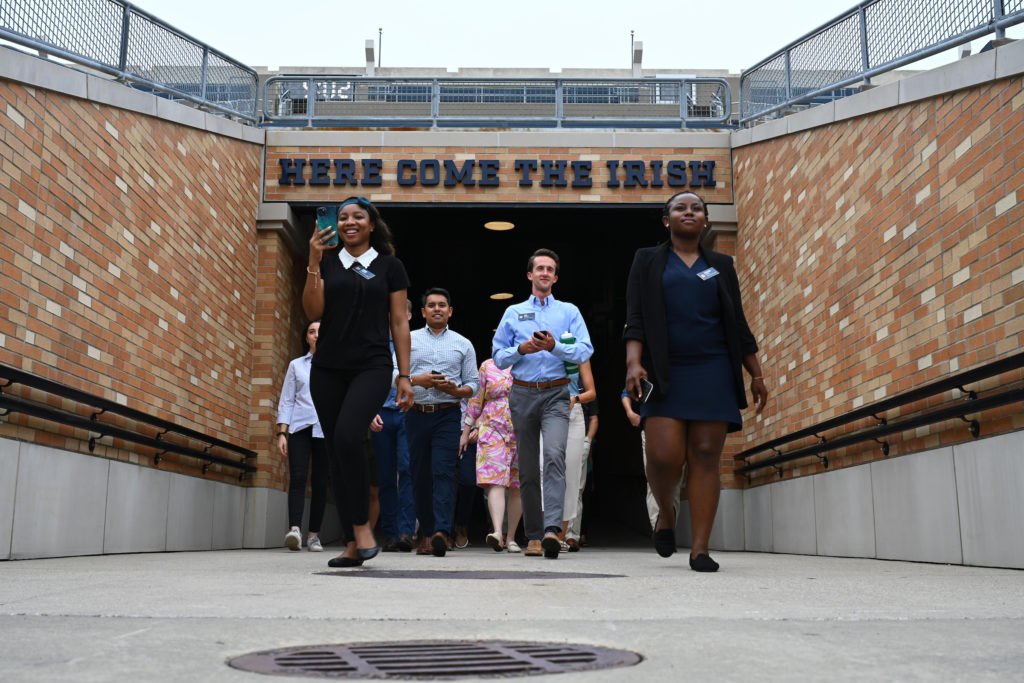
(Photo by Matt Cashore)
WHAT MAKES NOTRE DAME DIFFERENT
When people hear “Notre Dame”, they picture the Golden Dome and the Basilica, Saturday afternoon tailgates and Sunday morning mass, the Four Horsemen and winning one for The Gipper (or Rudy). Sure enough, the first year has lived up to the lore for the Class of 2023. The Grotto has been Dan Chapman’s favorite spot on campus. To him, it epitomizes what makes the school so unique.
“The Grotto is a special place to spend a few quiet moments in reflection, he notes. “For me, the Grotto has been a place where I can go to reconnect with my WHY and light a candle for my lost loved ones. Like the Grotto, the Mendoza program encourages students to take the time to reflect. Reflect on their purpose. Reflect on their values. Reflect on how business can be a source for good in the world. From my perspective, that sentiment is what separates Mendoza from other business programs.”
It’s not just the mission, but the people living it every day who make Notre Dame so special. Tanique Philogene lauds the school’s alumni support, hardly a surprise considering Mendoza posted the 2nd-highest average in The Economist’s annual survey of alumni. And it wasn’t just the alumni who made an impression on her.
“Before starting in the Fall, I had heard a myriad of stories regarding the amazing alumni network, the passionate professors, the committed academic staff, and the camaraderie amongst cohorts. Since being here, I can honestly say that all of it has held true.”
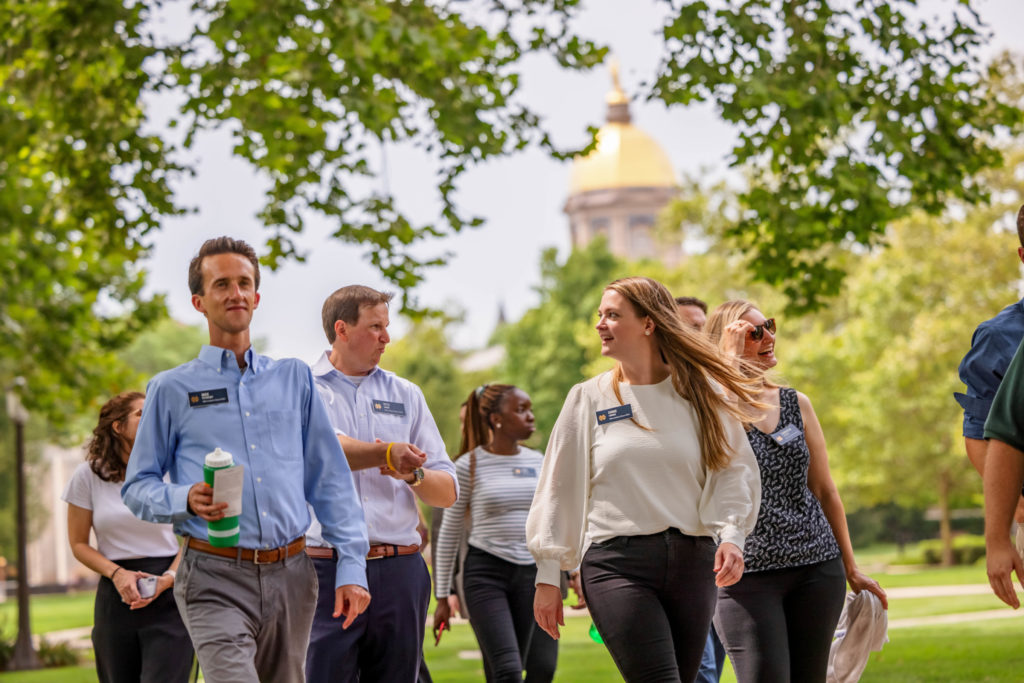
The Golden Dome, or Main Building, is perhaps Notre Dame’s most iconic landmark on the University’s 1,200-acre campus in South Bend, Indiana. (Photo by Peter Ringenberg Photography)
“GO BEYOND”
Philogene was equally stirred by the Mendoza faculty. “Mendoza staff has gone above and beyond to create a wonderful program for the professors to teach (to quote Professor Mike Meyer) “as if every day is the best day of their lives.” I am beyond ecstatic to have joined such a passionate community.”
The careful selection of classmates, coupled with Mendoza’s distinct view of business, makes the MBA experience all the more transformative, adds Napoleón Astorga Solano.
“Mendoza…motivate[es] each of the students to go beyond what the business customs might be to find better ways – often through collaboration and teamwork – to have a stronger positive impact in the local and global communities. The school offers core and elective courses related to ethical and inspirational business leadership, creating a sense of camaraderie within the cohort. Incorporating a multi-cultural and multi-background learning team from day one, the program is able to shape competent leaders with a global vision who maximize well-being to all the stakeholders of a business.”
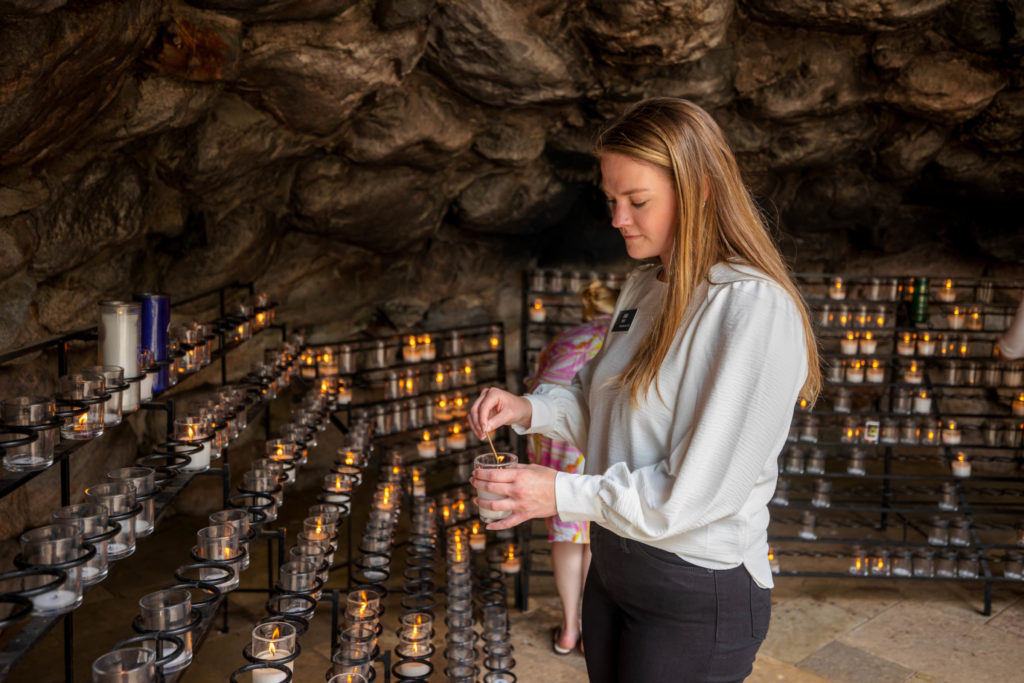
Faith is an important part of the Notre Dame MBA student journey. The Grotto of Our Lady of Lourdes provides a place of reflection and prayer for those seeking a quiet moment. (Photo by Peter Ringenberg Photography)
BUSINESS ON THE FRONTLINES
That vision is solidified by the signature experience of the Mendoza MBA: The Meyer Business on the Frontlines program – or BOTFL for short. For nearly two decades, Mendoza MBAs have headed to struggling nations like Honduras, Lebanon and Ethiopia to tackle issues ranging from stopping sex trafficking to sparking entrepreneurship. Thanks to new funding, the school can send 100 MBAs annually to these regions. At the same time, Mendoza expanded the BOTFL brand two years ago, offering a Frontlines in America course. Here, students address issues like poverty, violence, and addiction in areas ranging from South Chicago to Appalachia.
For Annie Crider, BOTFL represents the best of Mendoza’s curriculum. “This unique program offering merges academic learning with development of self, all oriented towards doing good for others. In this course, students partner with NGO’s and organizations in areas of poverty and strife to provide consulting services. Mendoza’s clear alignment of its values and actions is showcased in this course, and I am looking forward to participating in 2023.”
And you can expect a further expansion of the BOTFL experience according to Joseph Sweeney, academic director for the Notre Dame MBA Program. This spring, P&Q reached out to Sweeney to learn more about what current and future Mendoza MBAs can expect from the program. Here are his insights on this question, along with further thoughts on the Business on the Frontlines and Frontlines in America programs.
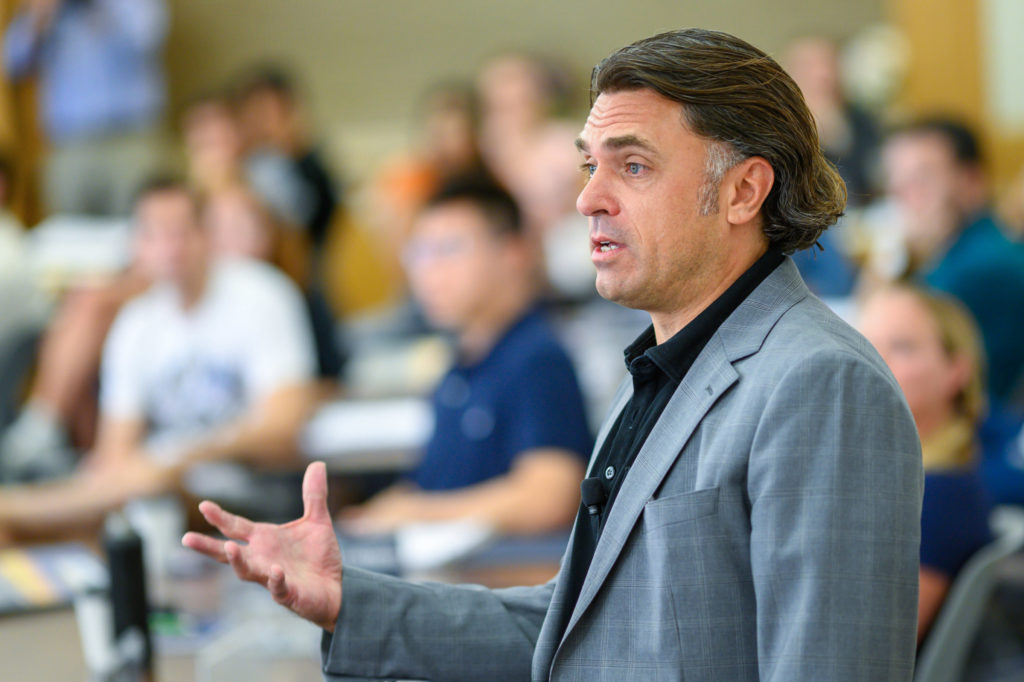
August 11, 2021; Professor Chris Atkins speaks at the 2-year MBA welcome session in the Stayer Center. (Photo by Matt Cashore/University of Notre Dame)
AN INTERVIEW WITH THE ACADEMIC DIRECTOR
P&Q: What are the two most exciting developments at your program and how will they enrich the MBA experience for current and future MBAs?
Sweeney: “The continued expansion of the Meyer Business on the Frontlines Program through the development of new courses is creating new ways for students to apply their business problem-solving skills to some of the world’s toughest problems in real time with dedicated action partners. For fourteen years, the full semester Business on the Frontlines course has served partners in communities facing some of the world’s toughest challenges, including post-conflict rehabilitation, illicit economies, isolation, and extreme poverty. Last year, the program launched its first domestic course, Frontlines in America, to tackle similar issues around the United States. This year, two additional courses were launched to create new ways for students to engage with new and on-going partners.
Frontline Engagements builds on the work of the full spring semester Business on the Frontlines class by working with partners in Latin America during the fall semester in a more limited engagement. Students participate in foundational discussions related to situational context and the role of business while working on live projects with partners in Honduras and Colombia, including a week in the field in October to problem solve around the financial viability of businesses being developed by ex-FARC combatants and the strategy to develop an entrepreneurial ecosystem in rural Honduras that can provide sustainable livelihoods.
Ways of Rebuilding Community (WORC) brings the same principles of the program home to our local community. By partnering with organizations within driving distance of campus, students are able to participate in class discussions and spend time working directly with the partners each week. Initial partners included a solar panel manufacturing start up with a mission to employ former felons, a local neighborhood looking to enhance economic development while preserving the diversity of the neighborhood, and an employee retention program focused on providing support services to remove barriers to work among at risk populations.
Each of the experiential service learning opportunities in the Meyer Business on the Frontlines Program draws on the multi-disciplinary skills that students gain throughout the MBA program and leverage them in real time to create actionable recommendations for partners. The rigor required to reach these recommendations helps to prepare students for the strength of market forces that will impact and drive their business careers.
Another key development this year is an update to the physical home of our MBA program. Following renovations to update existing spaces, creating additional lounge space, team rooms, and individual work and study spaces, the Stayer Center adjacent to the Mendoza building will become the permanent home to the full time MBA program and our Executive MBA programs. Originally built in 2013, the building previously housed executive and non-degree programs. MBAs currently have some classes in the building but through a series of expansion projects over the past two years and this coming spring, the facility will be ready to fully house the program and serve as a dedicated space for all of our MBA programs. In addition to classrooms, office space, and team rooms, lounge space includes one of the best views on campus, Notre Dame’s iconic Golden Dome.”
P&Q: What are two biggest differentiating features of your MBA program? How do each of these enrich the learning of your MBA students?
Sweeney: “At our core, Mendoza is about impact. This theme is woven throughout our curriculum so that students learn viscerally the power of business to shape the world around them. While individual courses may focus on specific topics like capital markets or business strategy, instructors and case examples continually reinforce the positive influence that well-run businesses can have not only for shareholders, but for customers, employees, and society at large. This helps to create future business leaders with a perspective that their enterprises can benefit more than just their own bottom line.
Hand-in-hand with a focus on impact is the support of an outstanding network. A truly global network, the Notre Dame Alumni Association features over 250 alumni clubs worldwide. In addition to geographically-based clubs, students and alumni can engage in affinity groups such as Black Alumni, the Diversity Council, and the Asian-Pacific, Hispanic, and Native American Notre Dame communities.
Beyond the formal club structures, Notre Dame alumni can be found in the top MBA hiring companies around the country. As one of the most responsive networks in the world, fellow Domers are quick to offer tips, perspective, and friendly advice remotely in addition to staying engaged with key courses and recruiting activities on campus. Their unique perspectives from industry help to provide additional context for students as they explore new industries and opportunities. Pro tip for alumni interaction: sign-off with a hearty ‘Go Irish!’.”
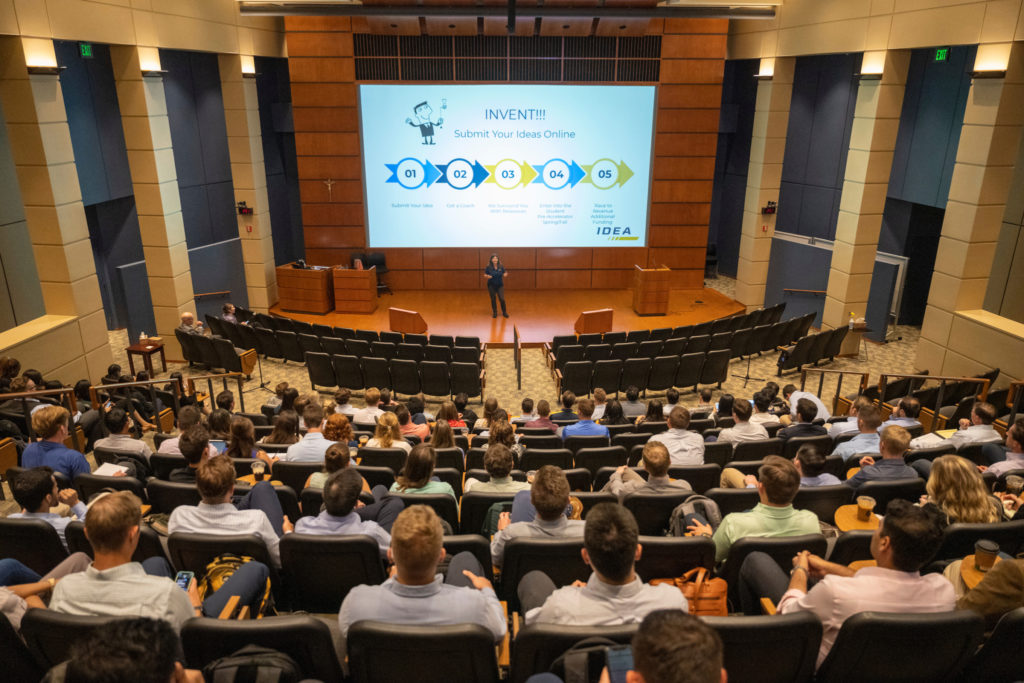
Notre Dame’s IDEA Center provides students interested in entrepreneurship with coaching and support in launching new ventures. (Photo by Barbara Johnston/University of Notre Dame)
P&Q: In recent years, there have been several areas that have gained increased prominence in business school programming, including STEM, analytics, artificial intelligence and digital disruption. How does your full-time MBA program integrate these concepts across its curriculum?
Sweeney: “The rise of analytics across business disciplines is undeniable and has become a core part of the MBA curriculum at Mendoza. With five STEM-designated major options, students have a variety of pathways to navigate a highly analytical curriculum. These course offerings include experiential learning opportunities with industry and functionally specific topics such as Applied Digital Marketing.
In addition to the range of on-campus course offerings, we are excited to launch the Silicon Valley Mod Away program this year. Housed at Notre Dame’s California facility in Palo Alto, students have the opportunity to network with prospective employers across Silicon Valley while also engaging industry experts through experiential learning opportunities. In the seven weeks between fall break and Christmas break, the program provides the opportunity to connect with key alumni in the Bay Area while taking classes focused on digital innovation such as Digital Product Management, Digital Innovation, and Smart Supply Chain Innovation. The program also facilitates discussions with leaders from key companies such as Google, Meta, IDEO, LinkedIn, and Adobe.”
P&Q: Last year, you launched a Frontlines in America program where MBAs work with underserved populations. Talk to us about what is involved in these projects and some of your Frontlines projects will be this year?
Sweeney: “This year, Frontlines in America partnered with three outstanding organizations: Homeboy Industries in Los Angeles, Coalfield Development in West Virginia, and the Gary Comer Youth Center in Chicago. Each of these organizations serves vulnerable populations including former gang-members, recovering addicts, and at-risk youth.
Each partner works with the Meyer Business on the Frontlines team to develop a scope of work that leverages the business skills of our MBA students and addresses a critical need for the partner organization. For example, Coalfield Development serves as an incubator and investor in social enterprises serving Appalachia while providing employment, education, and personal development opportunities for team members. They asked the Frontlines in America team to examine the commercial viability of developing a tourism ecosystem in Mingo County, WV to help drive economic activity while showcasing the natural beauty of the Appalachian Mountains. Through intensive research and collaborative problem solving virtually and in-person in the community, the team provided a set of pragmatic recommendations around support, strategy, and partnerships for Coalfield that are already being implemented to help develop the ecosystem and drive employment.”
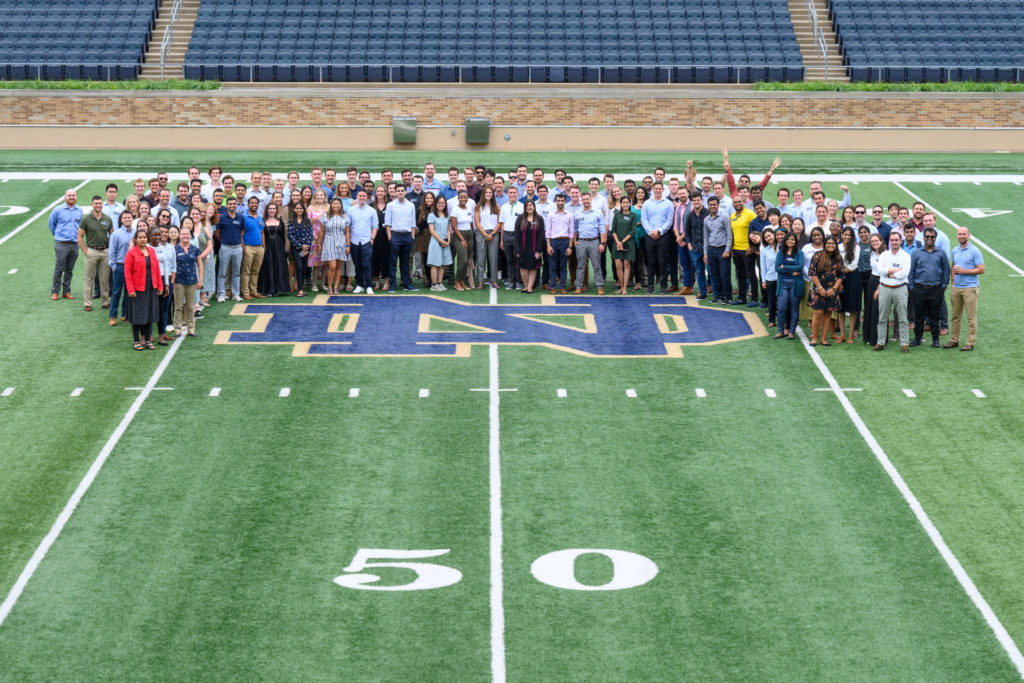
MBA students take the field in the famed Notre Dame football stadium during their orientation. Football and other sports provide an exciting element to student life on campus. (Photo provided by the University of Notre Dame)
P&Q: What have your employers told you are the two biggest strengths of your graduates and how does your programming bolster these differentiators?
Sweeney: “Employers look to hire Mendoza graduates for a wide variety of characteristics and skills but two that often stick out are the ability to build relationships and business problem solving skills. Building relationships goes hand-in-hand with an intentionally small, close-knit community. This emphasis naturally attracts students that are eager to get to know everyone in the program. Likewise, the strong focus on the powerful alumni network gives students the opportunity to develop relationships in industry and gain experience building connections while in the program.
Business problem-solving skills are developed initially through a core problem-solving class and then reinforced through a range of experiential learning opportunities that require students to draw on practical problem-solving to address critical issues in real time. This layered approach helps students learn fundamentals and then exercise their problem-solving muscles throughout the program.”
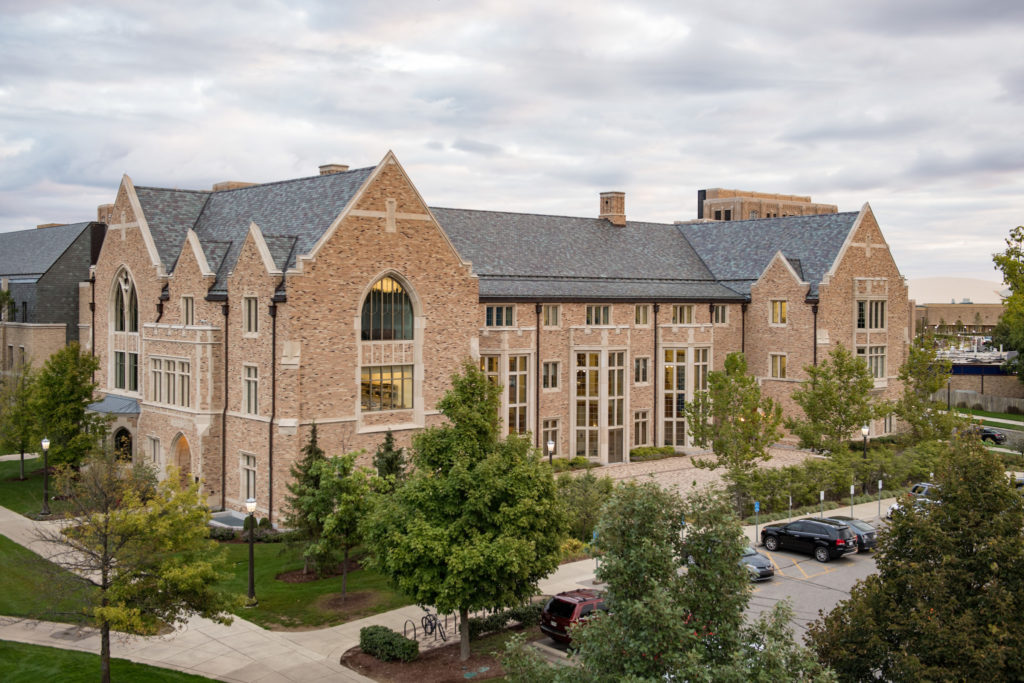
Stayer Center. (Photo by Barbara Johnston/University of Notre Dame)
P&Q: What are your two most popular courses among MBAs? What makes it so unique and so attractive to MBAs?
Sweeney: “Courses that encourage practical application and real-world client service are always attractive but add in a trip to Napa Valley and the opportunity to partner with an elite brand and it’s no wonder that students love Wendy Angst’s Innovation & Design Thinking course. This experiential learning course employs the principles of design thinking as it partners with Chappellet Winery to provide strategic insights and new ideas. Through the experience, students learn about the complexities of one of the most competitive consumer industries while considering the strategic considerations of a successful multi-generational business.
Another popular course is Seed Investor Practicum. Through this dual-track course, students spend time analyzing case studies and learning from a seasoned practitioner while simultaneously partnering with angel investor groups or VCs on live projects that examine investment opportunities, perform due diligence, or participate in ongoing company reviews. Students spend a focus week in person collaborating with the investors to kick off the course, followed by seven weeks in the dual track. This direct engagement provides an inside view to how investors make critical seed decisions.”
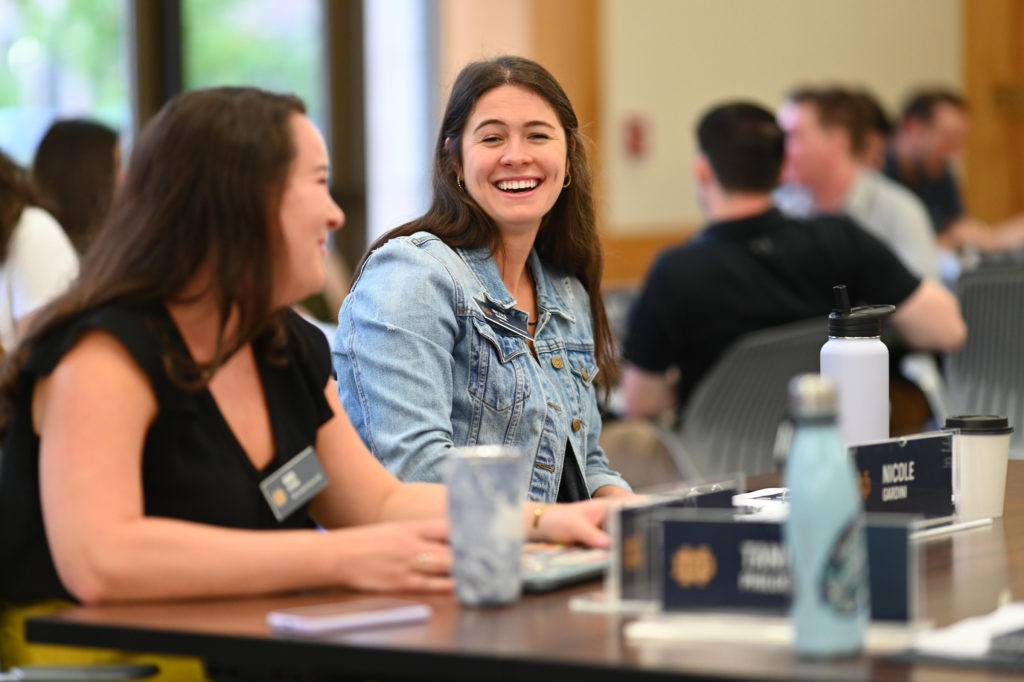
The Notre Dame MBA program focuses on developing students to be servant leaders by offering hands-on experiential learning, service opportunities and a culture of collaboration and teamwork. (Photo by Matt Cashore)
5 REASONS TO CONSIDER THE MENDOZA MBA
1) Business On The Frontlines: “The key part of the Mendoza MBA that led to my decision to attend Notre Dame was the Meyer Business on the Frontlines Program (BOTFL). In the program, students are given the opportunity to leverage their business acumen to address real issues in some of the world’s most vulnerable communities. I realize how much of a privilege it is to pursue an MBA; the opportunity to make a tangible difference while I furthered my education was of utmost importance to me. BOTFL serves as a direct medium for students to go beyond the classroom and “grow the good in business” through their studies and travel.”
Dan Chapman (’23)
2) Culture: “The first things that come to mind for most people are the campus, football games, Rudy, and of course a top-notch educational experience. But it is the Community that leaves the biggest impression and truly drives this school to create a “home away from home” atmosphere. The energy, the positivity, and the openness of everyone in the cohort is electric. Everyone is curious and everyone is willing to help no matter what the topic, venture, or class. It is truly exciting and something that I value most when someone asks, “Are you enjoying being back in school”?”
Christian Montgomery (’23)
3) The Mission: “There is a stigma attached to the business industry – one that is tied to ruthlessness, a singular desire to make money, and general greed. As a person who consistently works against this stereotype, it was more than refreshing to find a business school with a motto such a Mendoza’s “Grow the Good in Business.” That mission was the main draw to attend Notre Dame. I wanted to join the crusade to create a new understanding of what many think of as the “business world.” I believe that there is so much good that can be accomplished via the many businesses that populate the globe. I believe it is possible to employ our creative potential in such a way that brings value to both shareholders and the global communities we serve. At Mendoza, it is made clear in each and every class that our goal is to become the catalyst for good in our respective industries through integrity, kindness, honesty, and hard work. The accompanying phrase – Tender, Strong, and True – is also ingrained into our curriculum. These words act as a guide for how each student should live and work while attending and after graduating from Notre Dame.”
Tanique Philogene (’23)
4) Leadership Launch: “The Leadership Launch stands out to me so far at Mendoza. This is a 4-day intensive leadership program designed to create a strong foundation for your journey at Mendoza. My most memorable experience was when we were asked to bring a value artifact and tell a story around it. My colleagues brought artifacts ranging from picture frames to a cello. This helped me better appreciate the diversity of our journey and it reinforced the fact that we all bring something to the table though we are from different backgrounds with varying experiences.”
Funmi Owopetu (’23)
5) Intramural Football: “My favorite activity so far at Mendoza has been competing alongside my classmates in Notre Dame’s intramural flag football league. After a devastating double overtime semi-final loss – with a chance to play inside Notre Dame Stadium on the line – we are counting down the days till next season.”
Dan Chapman (’23)
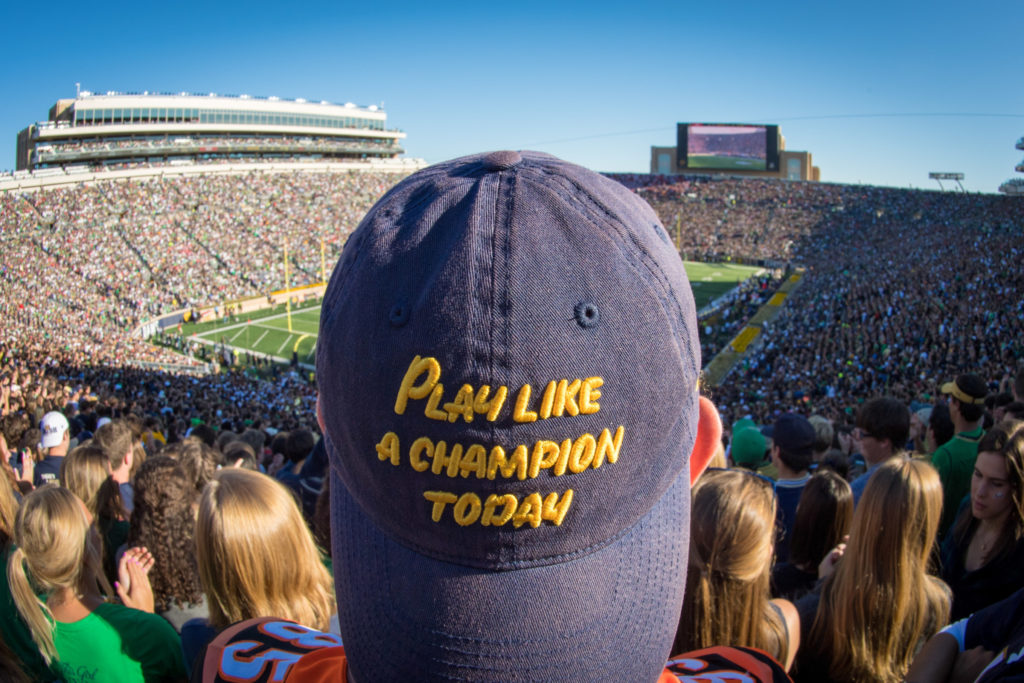
Student section of Notre Dame Stadium (Photo by Matt Cashore/University of Notre Dame)
ADVICE TO PROSPECTIVE APPLICANTS
“As part of the admissions process, you will have to put together a 4-slide deck about yourself. Have fun with it! It is not meant to be a professional pitch. This is your chance to show the admissions committee who you are outside of your resume and your essays. Play up your other interests, show off your personality, and include some fun photos.”
Katie Kern (’23)
“My advice to future applicants is simple: consider what you have done to try and improve not only yourself but also the world around you. Mendoza is looking for bright people who wish to make a positive impact on the world. I advise you to highlight how you have evolved, or made an impact in your career. Remember that an act as simple as mentoring a colleague, leading a project, or serving your community can have a great impact.”
Tanique Philogene (’23)
“I told compelling stories, both in my essays and during my interviews, that were consistent with my personal brand and aligned with Mendoza’s mission of growing the good in business. Each story included a problem that I faced, how I tackled the problem, the action I took to resolve the problem, and the end result. Within the framework, every story’s overarching theme consisted of my three foundational values, including courage, perseverance, and service to a greater good. Having a clear structure helped me feel confident in my application process and gave me an edge at Mendoza.”
Molly Lawrence (’21)

Mendoza College of Business graduate students meet in the Center for Career Development in the Duncan Student Center. (Photo by Barbara Johnston/University of Notre Dame)
CLASS PROFILE
The Class of 2023 features 143 students who bring a 670 average GMAT to South Bend. Women make up 35% of the class, with international students and underrepresented minorities accounting for 35% and 7% of first-year students respectively. Overall, 23 countries are represented in the class (including the United States).
| MBA Student | Hometown | Undergrad Alma Mater | Last Employer |
| Temitayo Ade-Oshifogun | London, UK | University of Illinois at Urbana-Champaign | Daplabs |
| Raghav Agarwal | Mumbai, India | The Institute Chartered Accountants of India | Validus Wealth Private Limited |
| Napoleón Astorga Solano | Managua, Nicaragua | Universidad Americana | Central American Bank for Economic Integration (CABEI) |
| Dan Chapman | Toronto, Ontario | University of Western Ontario | CBRE Limited |
| Annie Crider | Jefferson City, MO | University of Notre Dame | Diocese of Jefferson City |
| Kyle Fiebernitz | Bancroft, MI | Grand Valley State University | U.S. Navy |
| Katie Kern | Barrington, IL | University of Wisconsin | Willis Towers Watson |
| Natalie Kvochak | Aliso Viejo, CA | Villanova University | NV5 |
| Christian Montgomery | Redding, CA | University of Oregon | adidas |
| Funmi Owopetu | Osun State, Nigeria | University of Ibadan | Innovation, De-risking, Enterprise, and Acceleration (IDEA) Center |
| Tanique Philogene | Silver Spring, MD | Loyola University of Maryland | Morgan Stanley |
| Chloe Yang | Taiyuan, China | McGill University | IG Wealth Management, Power Corporation of Canada |

